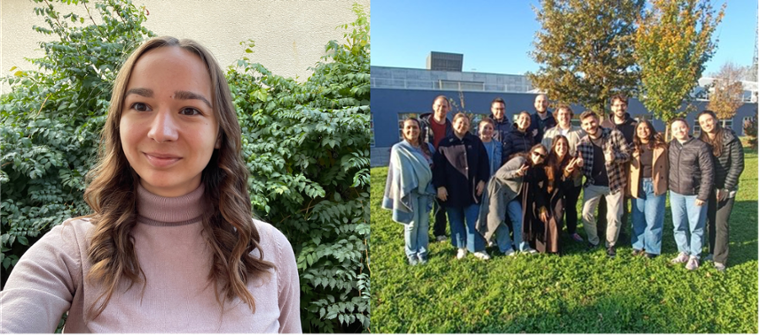EUTOPIA Breakthroughs: A new series of remarkable stories from our network of universities
Across Europe, researchers at EUTOPIA’s partner universities are pushing boundaries to address some of the world’s most pressing health challenges. From restoring fertility in cancer survivors to revolutionising medical imaging and tackling antibiotic resistance, our partner institutions are driving breakthroughs that have the potential to transform lives.
In this article, we highlight these remarkable stories from our network of universities, showcasing the groundbreaking research and development shaping the future of health and medicine.
Tackling Antibacterial Resistance Without New Antibiotics
At Universitat Pompeu Fabra (UPF), researchers are addressing one of the most pressing global health challenges—antibacterial resistance. A groundbreaking study led by the University of California San Diego and involving Jordi Garcia-Ojalvo, a professor at UPF’s Department of Medicine and Life Sciences, proposes an unexplored approach: limiting bacteria's access to magnesium (Mg²⁺).
Some bacteria develop antibiotic resistance through mutations in their ribosomes, allowing them to evade the effects of drugs like erythromycin. However, these mutations come with a cost; the bacteria accumulate more magnesium, which disrupts their energy production and overall viability. By exploiting these vulnerabilities in antibiotic-resistant bacteria, the research suggests that controlling magnesium availability could hinder the survival and spread of resistant strains. This approach offers a promising alternative to the continuous development of new antibiotics, which is both costly and leads to further resistance over time.
The findings could revolutionise how bacterial infections are managed globally, providing a sustainable strategy in the fight against drug-resistant pathogens. In the long term, this discovery could pave the way for new treatment methods that focus on manipulating bacterial environments rather than directly attacking them with antibiotics. The study's approach could play a pivotal role in reducing the rapid emergence of resistant strains and improving the efficacy of existing treatments.
Find out more here.
Pioneering Fertility Restoration with Testicular Tissue Transplants
Chemotherapy and radiotherapy, while life-saving, frequently result in lifelong infertility, particularly in boys treated before puberty. To counter this, testicular tissue can be removed before treatment and frozen to preserve the potential for fertility restoration later in life. Researchers at Vrije Universiteit Brussel (VUB) have been at the forefront of this effort and have now achieved a historic breakthrough in fertility restoration.
After launching the world’s first testicular tissue cryopreservation program in 2002, researchers at VUB and Brussels IVF have now successfully reintroduced cryopreserved tissue into an infertile man who underwent chemotherapy during childhood. Using cutting-edge cryopreservation and stem cell technology, this procedure could potentially restore his ability to produce sperm. The re-implanted tissue, preserved for 16 years, aims to re-stimulate sperm production. In a year’s time, researchers hope to confirm whether fertility has been successfully restored. Doctor Veerle Vloeberghs, staff member at Brussels IVF explains:
“This is an important step in further scientific research to preserve the fertility of children with cancer or other blood diseases for the future. While the procedure is specifically designed to restore fertility, we cannot at this time guarantee that it will be successful or that patients can go on to have children. This treatment offers lots of perspectives for these young adults. They now have options that they did not have until recently.”
This breakthrough is the result of years of research and collaboration, funded by the Research Foundation Flanders (FWO) and the VUB. This clever procedure offers hope to young cancer survivors, providing a potential path to preserving and restoring fertility.
Find out more here.
Accelerating Medical Image Analysis with Artificial Intelligence
Researchers at the António Xavier Institute of Chemical and Biological Technology, of the NOVA University Lisbon, have developed a revolutionary AI-powered tool, NanoPyx, designed to drastically improve the speed and accuracy of biomedical image analysis. This cutting-edge technology can process complex microscopy datasets up to 100 times faster than traditional methods, significantly reducing analysis times from hours to minutes—or even seconds.
The tool leverages machine learning to adapt dynamically to different microscopy images, ensuring precise and reliable results. This breakthrough has major implications for biomedical research and clinical applications, particularly in tracking viral infections, cancer progression, and neurodegenerative diseases such as Alzheimer’s.
NanoPyx also opens the door to the development of smart microscopes, which could perform real-time analyses of biological samples, automatically adjusting imaging parameters based on the data they capture. This advancement could accelerate drug discovery, improve disease diagnosis, and enable more personalised treatment strategies by allowing researchers and clinicians to analyse biological changes as they happen.
By streamlining image analysis and enhancing diagnostic precision, NanoPyx represents a significant step forward in biomedical imaging, with the potential to impact a wide range of scientific and medical fields.
Find out more here.
Written by Nathan Lindstrom

